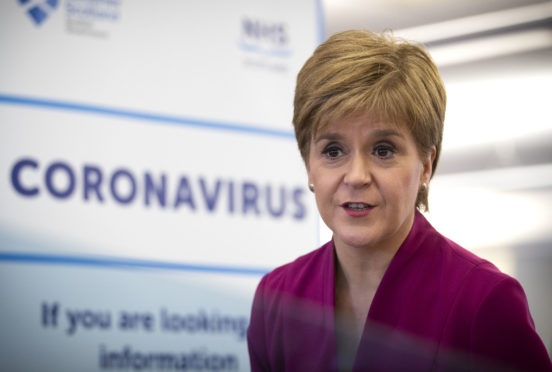
The coronavirus outbreak is an anxious time for everyone. It is a global public health challenge the like of which we have not faced in recent times.
But I want to assure everyone we are doing everything we possibly can to make sure we are as well prepared as possible to meet that challenge.
The way we go about our everyday lives is going to have to change. We have already taken steps to cancel large-scale gatherings, and the sporting authorities here and in other countries have moved to stop football, rugby and other events for the time being.
We cannot say how long exactly these and other possible restrictions may last, but the priority is protecting everyone’s health as far as possible.
It is clear that things will not return to normal for some weeks to come – and that may turn out to be months.
The simple fact is that, however much we may wish otherwise, we cannot eradicate this virus.
And, for as long as there remains no vaccine, that means we have to take sensible everyday steps to limit its spread among the population.
The most urgent priority is to protect those who are most vulnerable to the condition – principally older people and those with underlying health conditions.
All of us have a role in minimising and slowing the spread of the virus, in order to protect those who are more susceptible to serious illness.
One of the simplest but most important things people can do is to wash their hands regularly and thoroughly, and to keep other important hygiene measures in mind, such as avoiding touching their face as far as possible, covering their nose and mouth with a tissue when sneezing, and binning tissues.
If people start developing symptoms such as a fever or a persistent cough, we are asking that they stay at home for seven days. People can return to work after seven days if they are improving and no longer have a temperature. People should call their GP or NHS 24 (111) if symptoms are worsening or if they haven’t improved after seven days.
People should also think about how those who need to stay at home can be supported during that time by family, friends and neighbours.
One of the main challenges we face is to flatten the curve of infection over the coming weeks.
That means, in simple terms, trying to limit the number of infections at any one time so that the health service is not faced with a massive spike in demand at the same time.
If we can successfully do that then we can hope to see infections at a rate where the NHS – which is building up extra capacity to cope with extra demand – is able to get the best possible care to those who need it most.
Of course that is also likely to mean that, by flattening the infection curve, we see the outbreak last for a longer period, but in a more manageable way.
Other countries have taken the step of closing schools – that is not something we have done but it has to remain an option on the table.
At all times we will be guided by expert medical advice, and we will continue to work closely with the UK Government and the other devolved administrations.
It is important to bear in mind that the vast majority of people will have only mild symptoms if they contract the virus. But we have to do all we possibly can to help those who will be more seriously affected.
Things will return to normal, and we will get through this, but people need to be prepared to live their lives differently for some time to come.

Enjoy the convenience of having The Sunday Post delivered as a digital ePaper straight to your smartphone, tablet or computer.
Subscribe for only £5.49 a month and enjoy all the benefits of the printed paper as a digital replica.
Subscribe